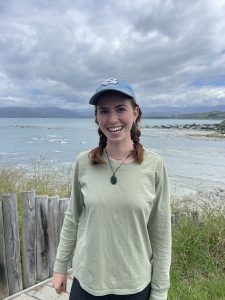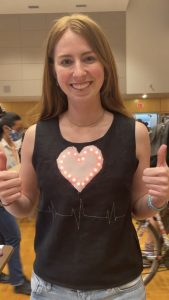
Charlotte Dorn has big plans that will take her to the opposite side of the world after graduating this spring.
A recipient of the Morehead-Cain Scholarship, among the most prestigious merit scholarships in the country, Dorn is earning a degree in computer science and a minor in applied sciences and engineering (APSE) through the department of applied physical sciences. This summer, she will travel to New Zealand to begin her career as a research and development (R&D) engineer at Halter, a cattle technology company where she previously interned as a data scientist.
“R&D allows me to experiment, learn and address problems that haven’t been solved before,” Dorn says. “I hope my work at Halter will yield positive changes in how land is used for agriculture. ”
In her new role, she will examine how technology can be applied to regenerative agriculture and reduce the environmental impact of the dairy and grazing industry. Dorn explains that regenerative agriculture is a holistic approach to land stewardship.
“Regenerative agriculture strives to change our ranching and farming practices to ultimately work with nature instead of against it,” she explains. “These efforts can result in improved environmental health while also producing better quality products.”
Dorn’s specific focus is on rotational grazing.
“This is the practice of intentionally moving cattle through pastures in a way that aligns with natural systems to rebuild soil health and add nutrients and structure, rather than deplete it,” she says. “My hope is that solutions like virtual fencing and other cattle technology can utilize sensing to gain valuable insights about land use and implement beneficial changes with lower costs.”
Dorn initially pursued the APSE minor because of her passion for applying technology to solve real problems.
“I chose computer science as my major but was still looking for a way to engage with the problem-solving associated with engineering,” she explains.
The APSE minor offers an effective approach to problem-solving, integrating technical skills with an entrepreneurial mindset to address challenges. Engineers with an entrepreneurial mindset approach problem-solving with curiosity to identify unexpected opportunities and make connections with knowledge across disciplines. This approach adds value to any problem-solving approach and generates improved solutions.
“Courses in the APSE minor focus on the problem-solving skills critical to engineering,” she adds. “Through these classes, I gained valuable knowledge about physics, mechanics, microelectronics, electrical engineering and electromagnetism. For me, it was incredibly important to know how things work beyond software.”
Dorn explains that the APSE minor allows students to pursue their individual interests and goals.
“If you are interested in the physical applications of software, including environmental applications, autonomous vehicles, wearable technology or biomedical technology, you should definitely consider the APSE minor,” she advises. “Choose courses that speak to your interests, focus on skills you want to hone and create your own student journey to reach your career goals.”
Dorn praises the holistic approach of APS faculty to educating students.
“The faculty in the APS department are phenomenal,” Dorn says. “They truly care about cultivating students and supporting each student’s career direction. They help students identify what jobs can be achieved in the future, how to build portfolios and showcase work in a meaningful way.”
Dorn reflects on the skills she learned and the sense of community at BeAM MakerSpaces where she served as a program assistant for two years. There, she learned how to teach makerspace classes, helped students with projects and maintained 3D printers and laser cutters. She advanced to become a digital fabrication specialist focusing on 3D printers.
“BeAM is a wonderful example of the intersection of technology and problem solving,” she says, adding that she frequently applies skills from the APSE minor and BeAM to complete professional projects. “I’ve found applications for sewing skills, fabrication knowledge, understanding how 3D printers work and how different materials interact,” she explains.

“The best quality of BeAM is the people who use it,” she adds. “Individuals from across campus can come together in a passionate, collaborative and student-focused environment.”
This supportive environment promotes networking by making students feel confident and comfortable to foster valuable relationships with peers and faculty.
In spring 2022, Dorn completed an independent study in e-textiles, where she applied her interest in microelectronics while working with materials in their smallest form.
“It was a fun challenge to prototype and practice textile work while integrating the skills I had learned in classes and at BeAM,” she says.
Her final project of the independent study was the creation of a heartbeat sensor that visually demonstrated pulse at the same rate as the wearer’s heartbeat. To develop this product, Dorn utilized design principles reinforced throughout the APSE minor and foundational lessons from the applied sciences class, “Developing Your Sixth Sense: Designing Sensors and Electrical Circuits to Make Measurements,” taught by Richard Goldberg. She also applied her knowledge of signals and sensors to create vests that change light as a wearer moves closer to another person in a vest. Dorn presented both completed products at BeAM MakerFest, an annual event that invites to students to present their ideas and prototypes from research or entrepreneurial efforts.
While reflecting on past experiences and anticipating her professional journey, Dorn encourages others to follow their interests.
“Your work will become so much better if you follow what you are intuitively passionate about,” she says. “If you are enthusiastic about what you’re doing, the world will open up around you.”
Equipped with passion, essential engineering knowledge from the APSE minor and valuable lessons from BeAM, Dorn is ready to tackle critical problems wherever her career takes her.
By Applied Physical Sciences
